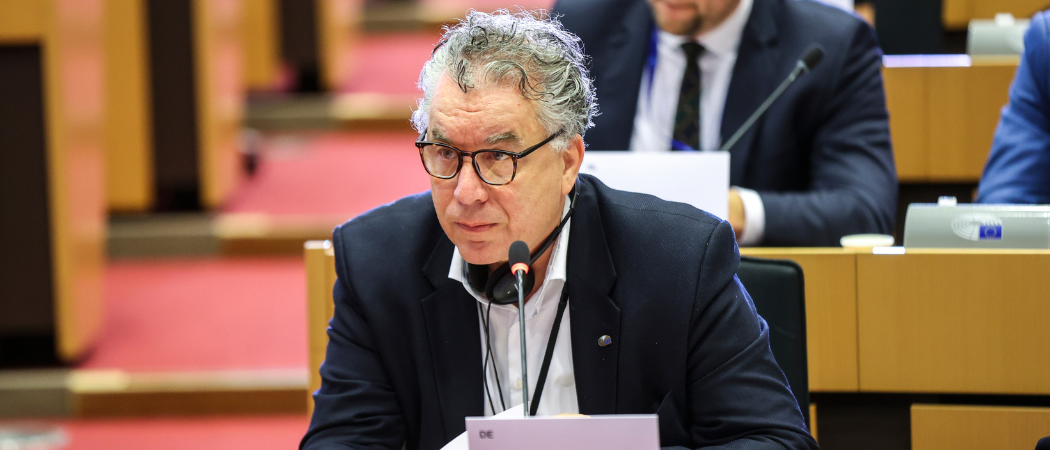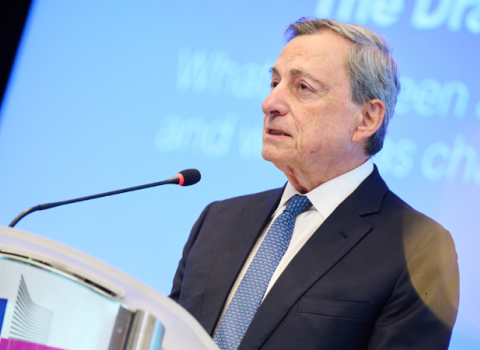MEPs say funding for translational research in Pillar 2 should not be cut in favour of basic research or funding for innovation scale-up

German MEP Christian Ehler. Photo credits: Alain Rolland / European Union
Some MEPs on the ITRE research and industry committee have objected to a proposal to double the funding for the European Research Council (ERC) and the European Innovation Council (EIC) in Framework Programme 10, which they say will result in cuts to pre-competitive research and innovation projects.
In the current Horizon Europe programme, Pillar 2, where academics and companies work on EU-defined challenges and priorities, accounts for almost 60% of the budget.
But an ITRE draft report published by Christian Ehler MEP, who represents the EPP Group on ITRE, wants to see a doubling of the budgets for the EIC and the ERC.
At an ITRE meeting on Tuesday to discuss the draft report, Spanish MEP Oihane Agirregoitia from Renew Europe opposed Ehler’s idea of raising the ERC and EIC budgets. “We have some reservations regarding the draft report,” Agirregoitia said. “The reduction of this pillar [Pillar 2] would be negative and would damage industrial regions like Basque country.”
If the proposal is approved without changes, “We estimate that only 34% would be dedicated to [Pillar 2], which could drastically reduce the attraction of European funds to our territory,” Agirregoitia told Science|Business.
Last week, EARTO, an association of Europe's leading research and technology organisations, warned in a reaction to Ehler’s report that “The recommendation to allocate 50% of the FP10 budget to the ERC and the EIC seems arbitrary and overlooks the crucial role of pre-competitive collaborative and applied research as well as of public-private partnerships under Horizon Europe.”
The European University Association (EUA) expressed similar concerns, calling for more consideration of the implications for the other FP10 instruments, like the Marie Skłodowska-Curie Actions (MSCA) and collaborative research projects in Pillar 2, particularly those at lower technology readiness levels.
MEPs did agree there is a need simplify and to limit bureaucracy in the next Framework Programme as a whole.
Criticisms of Pillar 2’s bureaucratic complexity, together with a lack of clear political guidance for shaping it in FP10, have spawned to rumours about its potential discontinuation in the next Framework Programme.
The University Alliance Stockholm Trio, consisting of Karolinska Institutet, KTH Royal Institute of Technology and Stockholm University, sent a letter last month to Marc Lemaître, director general for research and innovation, inquiring about the absence of discussions of pillar 2 in FP10.
“Without a strong pillar 2 there is no Framework Programme,” the letter says, emphasising the need to focus on pre-competitive collaboration between industry and academia to tackle societal challenges and to increase the competitiveness of European industry.

Raising issues
Agirregoitia was not the only ITRE member raising concerns about Ehler’s draft report.
During the meeting Ehler highlighted the need to place R&I experts at the forefront of the next research framework programme. This proposal builds on a concept proposed by a group of 15 experts led by former Portuguese science minister Manuel Heitor, calling for the creation of two independent councils in FP10 - an Industrial Competitiveness and Technology Council and a Societal Challenges Council - which would place the majority of the Framework Programme management in the hands of experts rather than the European Commission.
However, Italian MEP Elena Donazzan from ECR spoke against this, emphasising the importance of ensuring that FP10 does not become a "technocracy" and saying that leadership should continue to be guided by political decision makers.
In its reaction to the report, EUA called for “caution on ITRE’s support [for] the proposal to create two Councils in Pillar 2.” Keeping the two new councils separate could lead to isolation and less collaboration while these fields are “deeply intertwined,” EUA says.
In the draft report Ehler also proposed eliminating ‘most of the Missions’ and reducing the use of lump sum funding, arguing that both of these instruments are failing in their primary goals, namely attracting external funding and reducing transaction costs for beneficiaries.
“The number of instruments involved, the unsuccessful implementation of the Missions, as well as the many budgetary shifts, have resulted in unnecessary complexity which discourages applicants, and especially newcomers, from participating,” Ehler said during the meeting.
But the shadow rapporteurs René Repasi and Jens Geier disagree with the proposal of cutting Missions. “Missions should be enhanced and their execution improved to maximise their potential,” Repasi said.
S&D Spanish MEP Lina Gálvez backed this, saying she is more in favour of improving the Missions instead of deleting them from the programme.
French MEP Sarah Knafo expressed reservations about the Marie Skłodowska-Curie Actions, arguing that they divert a significant portion of the budget abroad.
In contrast, Ehler emphasised that the MSCA programme supports the EU’s Widening process by facilitating the exchange of researchers, which benefits member states with less developed academic institutions.
MEPs had until today to submit amendments to the draft report presented by Ehler, while negotiations for the final ITRE report on FP10 will continue until early next year, with a final adoption in a plenary session of spring 2025.





 A unique international forum for public research organisations and companies to connect their external engagement with strategic interests around their R&D system.
A unique international forum for public research organisations and companies to connect their external engagement with strategic interests around their R&D system.